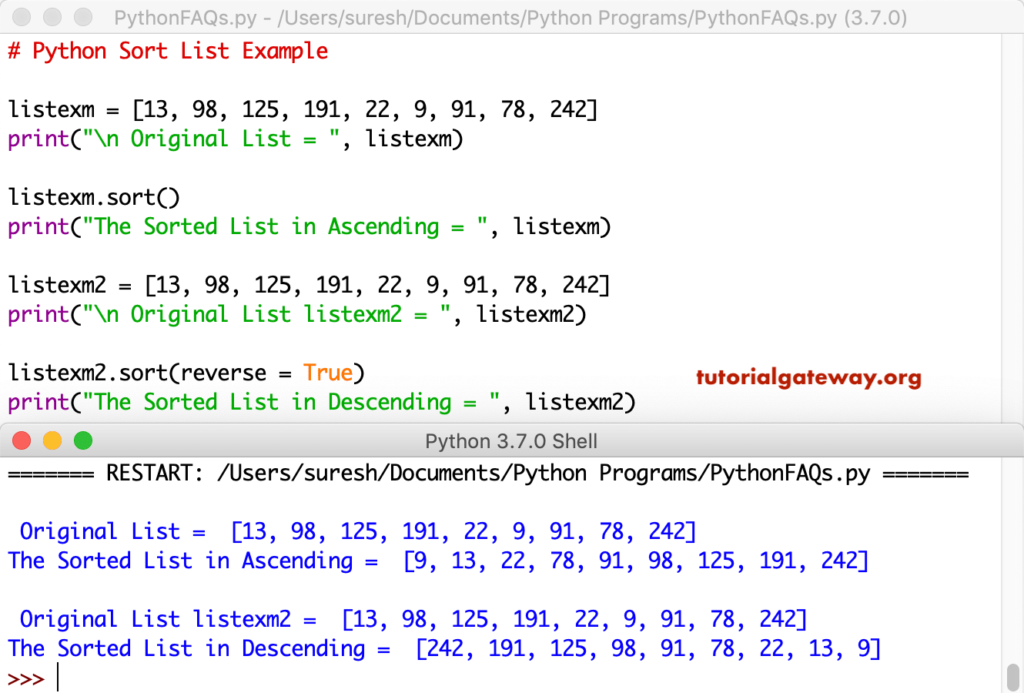


To sort a dictionary in reverse order, you can use the ‘ sorted()‘ function with the ‘ reverse=True‘ parameter.
Python sort list of dictionaries code#
If you want to sort the dictionary only once, after all key-value pairs have been added, you can move the sorting code outside the loop. Note that this code will sort the dictionary after each key-value pair is added, so the order of the dictionary may change with each iteration of the loop. Finally, we print ‘ sorted_dict‘ using the ‘ print()‘ function. We then use the ‘ dict()‘ function to convert the sorted list of tuples back to a dictionary, and assign it to ‘ sorted_dict‘. Use the sorted () function with two key parameters to sort the list of dictionaries in testlist based on the values of the Gfg key’s list at index idx and the best key, respectively. The result of ‘ sorted()‘ is a list of tuples, where each tuple contains a key-value pair from the dictionary, sorted by value. This variable will be used to sort the list of dictionaries based on the value of the best key. csvmappinglist.sort(keylambda item: item. In the following snippet, we sort the list of dictionaries by age. Instead, we can use the builtin sort function for lists. The lambda function takes an item (i.e., a key-value pair) and returns the value of the item, which is used for sorting. Sorting a List of Dictionaries With Sort Function Luckily for us, we don’t have to implement sorting by hand in Python. Otherwise, the program adds the key-value pair to the dictionary using the square bracket notation.Īfter each key-value pair is added to the dictionary, the program uses the ‘ sorted()‘ function to sort the dictionary by values, using a lambda function to specify the sorting key. If the user enters 'quit', the loop breaks and the program ends. We then use a ‘ while‘ loop to repeatedly ask the user for a key-value pair to add to the dictionary. python arrays list dictionary sorting Share Follow edited 12 secs ago executable 3,277 6 23 52 asked 30 secs ago YEVHEN 1 New contributor Add a comment 6700 2701 4280 Load 7 more related questions Know someone who can answer Share a link to this question via email, Twitter, or Facebook. In this example, we start with an empty dictionary ‘ my_dict‘. Sorted_dict = dict(sorted(my_ems(), key=lambda item: item)) Sorting on all keys in the dictionaries can be done with: a.sort (keylambda d: d.keys ()) b.sort (keylambda d: d.keys ()) To get the result you want we need to sort the keys on ascending order as follows: a.sort (keylambda d: sorted (list (d.keys ()), reverseTrue)) b.sort (keylambda d: sorted (list (d. # Sort the dictionary by values and print the result # Add the key-value pair to the dictionary Minimal Example: Consider the following example where you want to sort a list of salary dictionaries by value of the key 'Alice'.Key = input("Enter a key (or 'quit' to exit): ") The keys are unique and a colon separates it from value, whereas comma separates the items.


Dictionary represents the key-value pair in Python, enclosed in curly braces. We can also specify a key parameter that provides a function to decide the order of the elements. It can sort the list in ascending or descending order.
Python sort list of dictionaries how to#
You want to sort them by value of a particular dictionary key ( attribute). Ways to sort list of dictionaries using values in python Programming Python Server Side Programming In this article, we will see how to sort a list of dictionaries using values. Use the sorted () Function to Sort a List of Dictionaries in Python This function takes an existing list and returns a sorted list. Each dictionary consists of multiple (key, value) pairs. How to Sort a List of Dictionaries … … By Value?


 0 kommentar(er)
0 kommentar(er)
